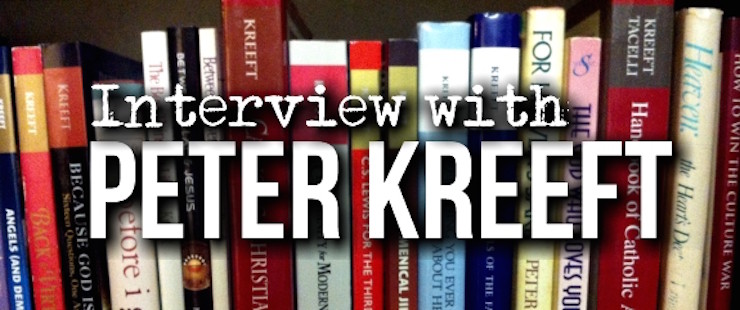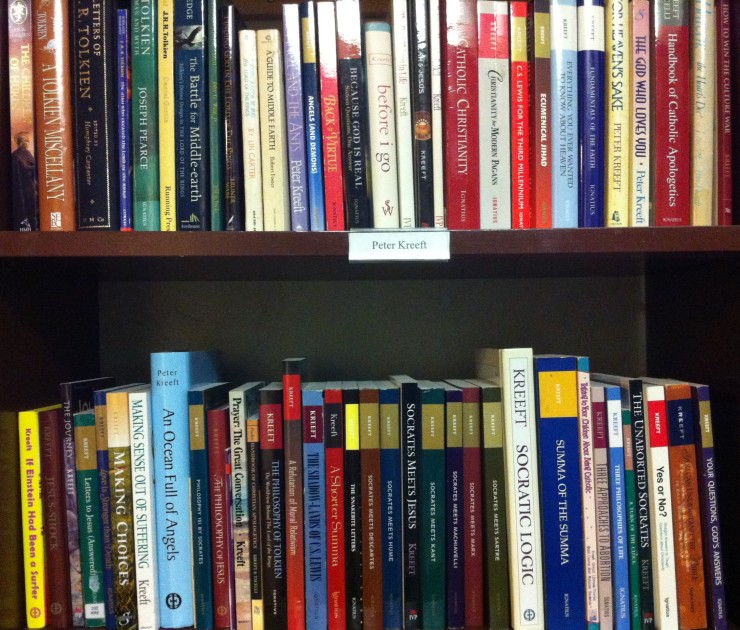Dr. Peter Kreeft is is a professor of philosophy at Boston College and at the King’s College (Empire State Building), in New York City.
 He is a regular contributor to several Christian publications, is in wide demand as a speaker at conferences, and is the author of over 67 books including the Handbook of Catholic Apologetics, Christianity for Modern Pagans, and Fundamentals of the Faith.
He is a regular contributor to several Christian publications, is in wide demand as a speaker at conferences, and is the author of over 67 books including the Handbook of Catholic Apologetics, Christianity for Modern Pagans, and Fundamentals of the Faith.
He regularly writes on philosophy, theology, and culture, and he’s an expert on C.S. Lewis and J.R.R. Tolkien.
In my opinion, Dr. Kreeft is the closest thing we have to a twenty-first century Lewis. Nobody mirrors Lewis’ total package like Kreeft: his cunning wit, sharp thinking, baptized imagination, and love for story and wonder. Just listen to some of his talks to see what I mean.
Dr. Kreeft recently sat down with me to discuss C.S. Lewis, the New Atheism, philosophy, story, books, and much more. Enjoy!
Brandon: You’ve written several books on C.S. Lewis, including C.S. Lewis for the Third Millennium. One of the prominent threats to Christianity in this third millennium is the so-called New Atheism. It’s spearheaded by Richard Dawkins, an emeritus fellow at Lewis’ own alma mater. How would Lewis respond to this modern form of atheism?
Peter Kreeft: Atheists in C.S. Lewis’ day were as snobbish and arrogant as they are now, but better educated and more capable of debate. Anthony Flew, for example, was eminently fair and intelligent (and, of course, therefore eventually became a theist).
The atheists Lewis knew were more like “The Great Knock” in Surprised by Joy or MacPhee in That Hideous Strength, in that they were quite intellectually honest. I suspect Lewis would prefer not to cast his pearls before swine, so he would probably ignore the so-called “four horsemen” of New Atheism.
Brandon: Your newest book, Summa Philosophica, begins by praising two styles of argument and calling for their revival: the Socratic dialogue and St. Thomas’ disputatio. Why are these forms so valuable and why have they been lost?
Peter Kreeft: The Socratic method and the Summa article are both ways of making an issue clear and fair and presenting both sides in a very rational way. They have been lost because philosophy has degenerated into ideology. Objective truth itself is sometimes often seen as a right wing Republican-Christian plot to take over the government (though the rhetoric is cleverer than that, that’s the bottom line).
Brandon: It would be a severe understatement to say you like C.S. Lewis and J.R.R. Tolkien. You’ve written several books on their fiction, and in 2011 you followed their path with your own novel, An Ocean Full of Angels (which I reviewed here). Why is story so valuable in communicating truth, goodness, and beauty?
Peter Kreeft: Story is the oldest, commonest, most beloved, and most effective form of communication because our life is essentially a story. That’s why the Bible is the most realistic of religious books. We can easily ignore or argue away abstractions, but we bump up against concretely real people, things, and events in story, as in life. It is easier to compare concrete things in a fictional story with concrete things in real life than it is to compare abstractions with concrete things in real life (though both are honorable and necessary things to do).
Brandon: Moving on to a simpler question, who is your favorite saint and why?
Peter Kreeft: St. Augustine, who has the Lewis-like combination of passionate heart, beautiful style, and deep understanding.
Brandon: Outside the Bible and Catechism, what are the top five books you wish every Catholic would read?
Peter Kreeft: Augustine’s Confessions, Pascal’s Pensees, Frank Sheed’s Theology and Sanity and Society and Sanity, and Brother Lawrence’s The Practice of the Presence of God. All of them bring heart and head together to powerfully push the reader up the road to the meaning of life, which is to be a saint, in head, heart, and hand.
The Confessions is unclassifiable; it has everything. The Pensees is the best modern apologetic book. Sheed’s two classics are the clearest popular introduction to Catholic theology I know. And Br. Lawrence’s is the simplest and most effective book for beginners in the spiritual life.
(Note: On Dr. Kreeft’s website he suggests seven more “highly recommended books”:
- Mere Christianity by C.S. Lewis
- The Abolition of Man by C.S. Lewis
- Lost in the Cosmos by Walker Percy
- The Everlasting Man by G.K. Chesterton
- Orthodoxy by G.K. Chesterton
- Brave New World by Aldous Huxley
- Lord of the Rings by J.R.R. Tolkien
Brandon: Suppose the Pope invites you to Rome where he ushers you to the balcony at St. Peter’s. He gives you one minute to address the watching world. What do you say?
Peter Kreeft: Listen to this man who ushered me here. Listen to his predecessors. Listen to the One who called him and other successors of Peter. For that One alone has the secret of eternal life and joy.
Check out Dr. Kreeft’s website at PeterKreeft.com. You’ll also find updates about his work on Facebook.
And if you liked this discussion, you can find several more on my Interviews page with people like Fr. Robert Barron, Archbishop Charles Chaput, Carl Olson, and more. Be sure you don’t miss future interviews by subscribing to the blog via feed reader or email.
What’s your favorite Peter Kreeft book?
My own Peter Kreeft collection.



